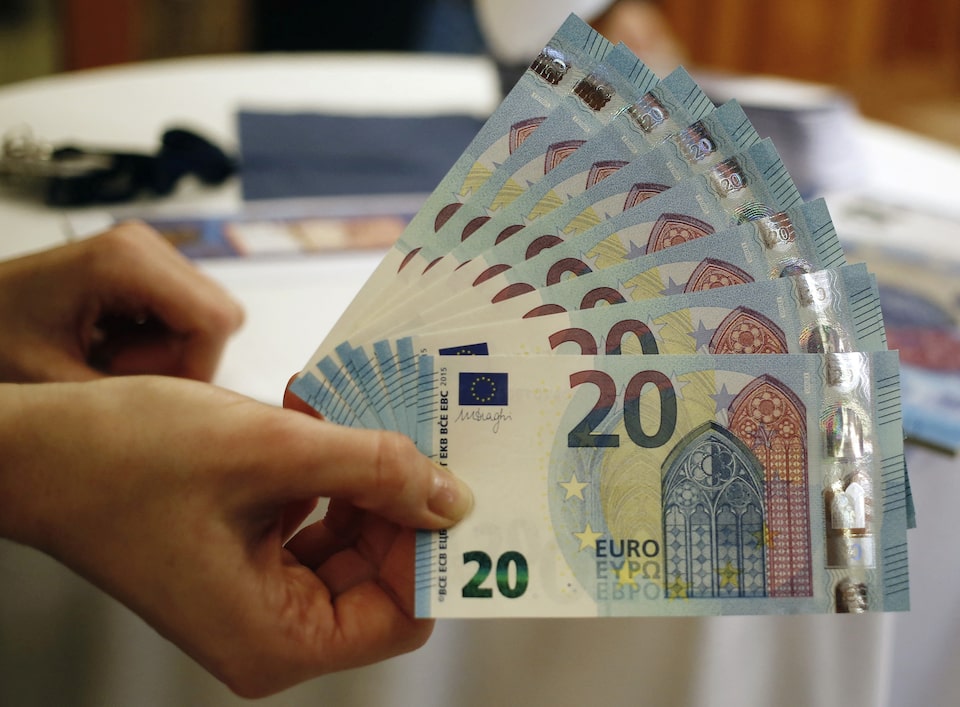New 20 Euro banknotes are presented at the Austrian national bank in Vienna February 24, 2015. REUTERS
Summary
- DAX up, Euro hits 1-mth high as Merz wins German vote
- Wall St futures bounce ahead of Nvidia earnings
- Asia stocks dip, trade thin with Tokyo on holiday
SYDNEY, Feb 24 (Reuters) – European shares and the euro climbed on Monday as Germany’s election produced a mainstream outcome, while Wall Street futures firmed on hopes results from AI diva Nvidia this week would justify the tech sector’s sky-high valuations.
DAX futures jumped 1.1%, while the single currency rose 0.5% to $1.0516 and looked set to test its January top at $1.0535. EURO STOXX 50 futures added 0.4% and FTSE futures 0.1%.
Germany’s new conservative leader Friedrich Merz still has to form a coalition government and it is not yet clear whether that will include one or two partners, with the latter likely to take more time and horse-trading.
The uncertainty comes as European Union leaders are set to hold an extraordinary summit on March 6 to discuss additional support for Ukraine and how to pay for European defence needs.
Liquidity was thinned by a holiday in Tokyo markets and MSCI’s broadest index of Asia-Pacific shares outside Japan (.MIAPJ0000PUS), dipped 0.5%. Nikkei futures traded at 38,310, under the cash close of 38,776.
Chinese blue chips (.CSI300), eased 0.1%, but Hong Kong shares (.HSI), firmed 0.2% to extend their recent tech-driven bull run.
“Chinese authorities have made a meaningful pivot in their rhetoric towards Big Tech and the private economy at large,” said Barclays analysts in a note.
“It may imply a policy shift intended to unwind very low local equity valuations, encourage inflows into China, and could moderate our bullish broad dollar and cautious EM views.”
S&P 500 futures and Nasdaq futures both gained 0.5%. The Nasdaq had fallen 2.5% last week, its worst week in three months, with losses led by the Magnificent Seven.
That pullback raised the stakes for Nvidia’s (NVDA.O),results on Wednesday where investors are looking for fourth-quarter sales around $38.5 billion and first-quarter guidance around $42.5 billion.
As usual, options point to a share price move of around 8% in either direction should the results surprise.
Wall Street had taken a hit on Friday when a survey on services showed a shock slide in activity amid concerns about tariffs and cost pressures. There were even reports the White House was pressuring Mexico to put its own tariffs on Chinese imports as part of a deal.
INFLATION SCARE
The Federal Reserve’s favoured measure of core inflation is due on Friday and expected to show a slowdown to 2.6% from 2.8%, but could be overshadowed by tariff worries.
A survey of U.S. consumers out on Friday showed inflation expectations for 5 to 10 years ahead climbed to 3.5%, the highest since 1995.
“Longer-run inflation expectations are at risk of becoming de-anchored,” warned analysts at ANZ in a note. “That was the clear message from the subset of soft U.S. economic surveys released on Friday, and for the Fed, the data signal that enhanced caution is required.”
At least nine Fed officials are speaking this week, some of them more than once, and are likely to reiterate the cautious message on further rate cuts.
Markets are not priced for an easing until July, with just two cuts implied all year.
Treasuries rallied in the wake of the soft services data, though inflation and supply uncertainties remain a hurdle and 10-year futures were down 5 ticks on Monday.
The drop in Treasury yields, particularly in real terms, has weighed on the dollar against the yen as Japanese yields rise on speculation of another rate hike from the Bank of Japan.
The dollar was pinned at 149.26 yen , having shed 2% last week to threaten chart support at 148.65. The dollar index dipped 0.3% to 106.210, with losses on the euro, sterling and Swiss franc.
In commodity markets, gold remained well supported at $2,942 an ounce , having climbed for eight weeks in a row.
Oil has been heading in the other direction in part on speculation an eventual peace deal on Ukraine could see sanctions eased on Russia, boosting its oil exports.
Brent slipped 10 cents to $74.33 a barrel, while U.S. crude fell 20 cents to $70.20 per barrel having hit a two-month low earlier.
Reporting by Wayne Cole; Editing by Shri Navaratnam





